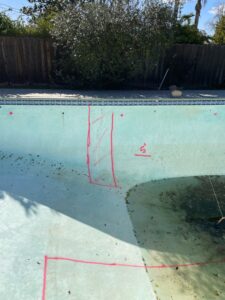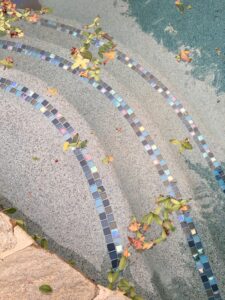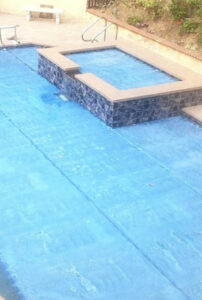Are you tired of constantly refilling your pool and wondering if it’s due to water evaporation or a leak? It’s a common concern for a pool owner and one that can be difficult to diagnose.
A leak can cause serious damage to your pool and surrounding areas if left unchecked, while evaporation is a natural process that can be managed with simple maintenance.
In this article, we’ll break down the difference between the two, how to check for each, and what you can do to manage each situation.
A Bit of Water Loss is Normal for Swimming Pools
Firstly, it’s important to note that a certain amount of water loss is normal for pools due to the evaporation process, splash-out, and backwashing.
The amount of water your pool loses due to evaporation depends on a variety of factors, including the size and shape of your pool. In general, you can expect to lose about a quarter inch to 1/2 inch of water per day due to evaporation rates.
If you have kids or frequently entertain guests in your pool, you can also expect to naturally lose water due to splashing and water displacement. Additionally, if you have a high water level, a powerful filtration system, or water features, you may lose more water than usual.
Do the Bucket Test to Check for Pool Evaporation
To check if water loss in your pool is due to normal evaporation, you can do a simple bucket test. Mark the water line inside and outside of the bucket and wait a full 24 hours.
After 24 hours, check the water level inside and outside the bucket again. If the pool water level and inside the bucket are roughly the same, then the water loss is most likely due to evaporation.
However, if the bucket test results reveal the opposite, then you may have a pool leak on your hands.
How to Minimize Pool Water Evaporation
Now that you have determined that the water loss in your pool is due to evaporation, here are some ways to minimize it:
1. Use a Pool Cover
Using a pool cover is one of the most effective ways to minimize pool evaporation. A pool cover can reduc
e water loss by up to 95% by shielding the water from high temperatures and dry air. This also facilitates condensation, which means much of what evaporates actually returns to your pool. As a bonus, this also prevents debris from contaminating the water, keeping your pool clean in the process.
2. Reduce the Water Temperature
Another way to combat water loss is to cool it down. The warmer the water and air temperature, the faster the water evaporates. Even reducing the temperature of your pool by just a few degrees can significantly lower the amount of lost water from evaporation.
3. Use Windbreaks
Wind is another major factor that contributes to pool evaporation. You can reduce the effect of wind by planting windbreaks such as trees, shrubs, or a fence around your pool. Aside from slowing down evaporation, this also provides shade, cancels out noise, and improves the privacy of your pool area.
4. Lower the Water Level
If you’re not using your pool, consider lowering the water level just below the skimmer. Be sure to follow proper pool maintenance guidelines and avoid draining too much water from your pool.
5. Maintain Proper Water Chemistry
If the water in your pool is too alkaline or too acidic, it can increase the rate of evaporation. Keep the pH level balanced to minimize water loss as much as possible.
The Most Common Reasons for Pool Leaks
If you’ve ruled out evaporation as the reason behind your pool losing water, it’s time to explore the possibility of a leak.
There are many possible reasons behind a pool leak, but one thing’s for sure: you need to have it fixed ASAP.
It won’t take long before a pool leak causes serious damage and sticks you with a large repair bill.
Below are some of the most common culprits behind a pool leak – some of which may surprise you:
Pipe and Plumbing Damage
Pipes and plumbing are two of the most common causes of pool leaks. These can happen due to:
- Cracks in the pipe
- Improperly sealed joints (where two pipes meet)
- Old or faulty pipes that have been exposed to harsh pool chemicals over time
- Poorly maintained pools that have developed rust and corrosion.
- Main drain leak
- Issues with your pool’s return piping
This type of damage is often fixable, but let a pool service company handle it. Damage to your pool’s plumbing is usually the tip of the iceberg, and improper repairs can cause even more problems.
Structural Damage

The pool itself can also spring a leak due to damage to the pool structure itself. This could include:
- Holes in the walls or floor of your pool
- Cracks in the tiles
- Damage to the coping (the edge around the pool)
- Expansion joints (gaps between two concrete surfaces)
- Underground leaks
Fixing structural damage is complex and may involve re-plastering the pool or using special epoxy to seal the cracks and holes.
Leaks in Pool Fittings
Leaks can also occur in fittings, such as skimmers and drains. These small cracks or breaks may be difficult to spot, but they can be responsible for a significant amount of pool water loss. These typically happen because of improper installation or wear and tear.
Issues with Pool Light Fixtures
This one’s often overlooked, but pool light fixtures can also be the culprit behind a leak. Light fixtures (not the light itself…the housing the light sits into) need to be sealed well to the pool structure. If they’re not, water can leak around them to the soil behind.
Additionally, the conduit that connects to the backside of the light niche can sometimes break. This can allow water from the pool to flow through the conduit and into the ground behind the fixture.
Clogged Drains
This one might be surprising as well – in some cases, clogged drains can cause your pool to lose water. If dirt, debris, or leaves are blocking the drain for long periods, it can eventually cause other issues such as cracking or warping.
While we do not perform leak detection, below are some ways you can check.
How to Check for a Pool Leak
Identifying pool leaks can be tricky, but there are several ways to check if it’s the reason why your pool is losing water. You may need a professional for some of these methods:
Bucket Test

The bucket test works for diagnosing both a pool leak and evaporation. Again, place a bucket on the steps of the pool and fill it with water.
Mark the water level in and out of the bucket, then turn off your pool’s filtration system for 24 hours. If the water level outside the bucket has gone down more significantly than inside it, you likely have a leak.
Dye Test
The dye test involves adding a small amount of dye to the water near the suspected leak and observing if the dye is pulled toward the leak. This test can be effective but requires some experience to perform effectively.
Pressure Test
This method involves pressurizing the plumbing system to detect leaks. This is done by sealing the pool’s plumbing lines and adding air pressure to the system. If there is a leak, the air pressure will drop. We strongly recommend not doing this yourself – it’s a highly technical process that requires specialized equipment and training.
Visual Inspection
Examining the pool’s structure, including the tiles, coping, and pool deck, for cracks or other signs of damage is an easy, but effective way to find a pool leak.
Soil Moisture Test
This is another simple leak test you can do yourself. Simply check the moisture level of the soil around the pool. In case of a leak, sometimes the soil will be drastically wetter than the surrounding soil. Sometimes this isn’t the case if the leak is small, deep below the surface, or the soil drains well, but it definitely can help identify a leak if the ground is noticeably more damp than usual.
For your peace of mind, you can also hire pool leak detection companies. Upon their findings, we shall perform the necessary steps to address the leak.
If You Suspect a Pool Leak, Call a Professional ASAP
It’s not just frustrating when your pool loses water – it can drive up your water bill, damage the surrounding area (aka your pool deck, your yard, etc.), and cause problems with pool chemistry.
Save for total structural failure, it’s possible to repair most types of pool leaks. Some of the solutions can include, but are not limited to:
- Re-plastering
- Adding epoxy compounds to repair leaks
- Replacing fixtures, such as pool lights or drains
- Sealing any cracks in the structure
- Replacing the tile grout
- Repairing underground plumbing leaks
Of course, diagnosis will be the first step towards fixing leak issues. Professionals will check every element of your pool, including the main drain, pool pump, pool skimmer materials, any existing water features, suction side plumbing, and more. They’ll also check for any environmental factors that may contributing to the leaks.
Keep Your Pool in Great Shape with Stanton Pools
At Stanton Pools, we understand how big of an investment pools are. And not just financially – a pool is a wonderful extension of your home, providing joy to your family and guests.
Let us help you protect your investment and make sure you enjoy it for years to come. We offer a full suite of pool services for pool owners in California and surrounding areas. We can help you with the following and more:
- Pool repair
- Pool equipment upgrade
- Pool cleaning and maintenance
- Remodeling
- Resurfacing
Contact us today for a FREE quote by calling (888) 214-0425 or sending us a message. We look forward to hearing from you!





0 Comments